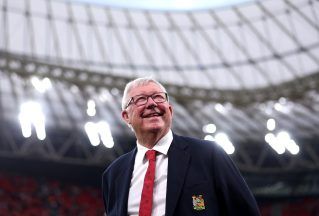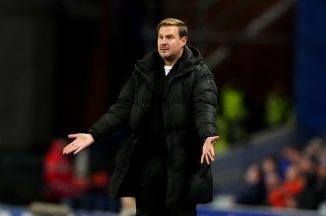For a while, it seemed like the eerie quiet of Hampden during Scotland’s 1-1 draw with Israel would be the main reminder that the Nations League was getting under way in the shadow of coronavirus on Friday.
Talk was focused on the tactics and whether the reshaping of a team to accommodate Kieran Tierney and Andrew Robertson was a price worth paying. Few were keen to see a repeat when Scotland travelled to play Czech Republic in their second group match in Olomouc on Monday evening.
And then the Czech FA announced that there would be no match in Olomouc on Monday evening. Concerns over two positive coronavirus tests in the squad had led the association to take action to prevent the virus from spreading further. The announcement was a surprise to the Scotland camp, who promptly issued a statement saying they hadn’t been told anything by the Czechs.
It was also a surprise to UEFA, who held talks with the hosts over the next 12 hours before a U-turn was confirmed. The governing body’s intervention and ‘show must go on’ attitude ensured that football will be played on Monday but raises questions about the level of competition.
Scotland will still fly east to play a team in Czech colours but it’s not yet known who will fill the opposition shirts.
Safety comes first, of course, and the Scottish FA were at pains to point out that, in addition to the strict protocols they have in place, they have received assurances that UEFA’s standards will continue to be met and that the Czech FA will fulfil “the stringent COVID-19 testing regime that is sacrosanct to ensure the safety of our players and staff”.
That’s unsurprising given the events that brought the hosts to their original decision.
Tracing the whole affair back to point of origin, concerns were first raised when a member of the Czech backroom staff tested positive in midweek as the squad was preparing to play Slovakia in Bratislava. The squad all tested negative but two players who had been in close contact: West Ham’s Tomas Soucek and RB Leipzig’s Patrik Schick, were told to self-isolate.
Travel arrangements were changed and players were driven to Bratislava in small groups instead of flying together as the Czechs tried to remove any risk. The match against Slovakia went ahead on Friday evening but it was later revealed that a second staff member tested positive for coronavirus that morning. The cancellation of the Scotland game was announced as the Czech players were still recovering from their exertions in their 3-1 win in Bratislava.
And so to Saturday morning’s talks with UEFA. The Czech FA have made it clear that the first part of their talks involved them listening as the law was laid down.
“The association was threatened with contumacy if it could not start the game,” they said. “But the FACR leadership managed to avert that.”
What was being threatened? It’s likely that UEFA pointed to their own new rules that were introduced last month before international football returned. They state that a game should go ahead if a team can field 11 players and two substitutes.
If the game can’t go ahead then it should be rescheduled (which seems sensible on paper but is fantasy with the competitive schedule filled to bursting in a shortened season). If the match can’t be rescheduled then UEFA will rule that the team at fault forfeits the match.
Forfeiting a match by a 3-0 scoreline is the universally accepted punishment for failing to fulfil a fixture, except for the time there was “One team in Tallin”.
Noting that a 3-0 loss would undo all the good work from their away win in Bratislava, Czech Republic bent to UEFA pressure and are now working to put together a new squad of players at very short notice.
Before a ball was kicked in the group, this away fixture would have been singled out as one of the toughest Clarke’s side would face. With a core of players from Czech champions Slavia Prague and a sprinkling of stars from the big five leagues, Jaroslav Silhavy’s side would have fancied themselves for a home win, particularly after the 3-1 thumping of Slovakia.
Instead, there’s no knowing what sort of team will take to the field, only that it will be weaker than the one that could have been fielded. Czech Republic will be deprived of their best and may even struggle to call on their second- and third-best with clubs now entitled to refuse call-ups because of the pandemic.
Steve Clarke spoke this week about his “empathy” for the Czechs after the crisis was first reported. It’s impossible to imagine he doesn’t feel for the players forced to miss out on an international, and particularly for his fellow manager Silhavy, who won’t be allowed to coach his team.
It’s a difficult situation and, bearing in mind that you can only play the team in front of you, Scotland players will be diligent and aim for a win that would likely put them top of the group.
Regardless, and through no fault of anyone at Hampden or in the Scotland camp, it won’t feel quite right to see opponents at a competitive disadvantage in the current situation.
It appears the Czechs have been giving regular updates since the start of their crisis, have changed their procedures and travel plans, and seem to have followed safety rules every step of the way.
Some will have little sympathy but as Clarke pointed out, “it could happen to any international squad around the world at any time”.
Czech Republic Reserves v Scotland may turn out to be a competitive affair, and nobody who has watched our national team over the years would assume any result in advance but UEFA might reflect on the decision to lean on nations to make sure that the show goes on.
This won’t be the last international affected by a virus that the world is still trying to get to grips with and while the effect on competition might be trivial in comparison to other factors, it’s the whole point of the Nations League.
These games were introduced to replace international friendlies. They shouldn’t be allowed to build bitterness and acrimony.




























